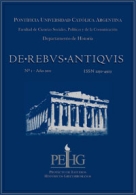Please use this identifier to cite or link to this item:
https://repositorio.uca.edu.ar/handle/123456789/6903| Título: | La credibilidad de la obra de Lucas (Evangelio- Hechos) en el contexto de la historiografía helenística | Autor: | Díaz, Pablo C. | Palabras clave: | EVANGELIO DE SAN LUCAS; HECHOS DE LOS APOSTOLES; HISTORIOGRAFIA; GENEROS LITERARIOS; HELENISMO; CULTURA GRIEGA; NUEVO TESTAMENTO | Fecha de publicación: | 2011 | Editorial: | Pontificia Universidad Católica Argentina. Facultad de Ciencias Sociales, Políticas y de la Comunicación. Departamento de Historia | Cita: | Díaz, P.C. La credibilidad de la obra de Lucas (Evangelio-Hechos) en el contexto de la historiografía helenística [en línea]. De Rebus Antiquis. 2011, 1 Disponible en: https://repositorio.uca.edu.ar/handle/123456789/6903 | Resumen: | Resumen: La presente colaboración pretende valorar la ‘historicidad’ de los textos del Nuevo Testamento, de aquellos que tradicionalmente se ha considerado que presentan una ‘envoltura’ ambiental más fidedigna. Tal tarea no puede llevarse a cabo sin un previo discernimiento de las diferencias que sus distintos textos presentan, sin explicar los ambientes distintos en los que cada tradición se forjo, ni la intencionalidad de los distintos géneros a los que se recurrió. La obra de Lucas, constituida por la suma del tercer evangelio sinóptico y de los llamados Hechos de los apóstoles, presenta la percepción más evidentemente diacrónica, desde el nacimiento de Jesús hasta la instalación del cristianismo en Roma, y suma casi un tercio del texto neotestamentario, bastante más si tenemos en cuenta que para su comprensión es necesario el cotejo con los otros evangelios sinópticos y con las cartas paulinas. La perspectiva desde la cual se enfrenta este estudio es la del historiador, no la de la exégesis, la obra de Lucas se analiza como si se tratase de un texto más de la tradición helenística. Un texto que ha de responder, por lo tanto, a unos cánones literarios comprensibles a sus hipotéticos lectores, un texto construido en los años de máximo esplendor del Imperio romano, muy probablemente a finales del siglo I, en un contexto geográfico y cultural de momento impreciso pero que ha de tener en cuenta los problemas palestinos posteriores a la guerra judía de los años 67-70 y el entorno de pugna religiosa y creatividad teológica que, necesariamente, habría de caracterizar a una religión nueva, aún en proceso de formación y que estaba perfilando y perfeccionando sus definitivas señas de identidad. En este sentido se ha de valorar la personalidad del autor y su nivel de compromiso con el grupo religioso del cual pretende presentar una semblanza; por supuesto, es necesario descifrar la intencionalidad del texto, mediatizada por el género y por el público al cual pretende llegar. Debemos insertar la información particular que Lucas-Hechos aporta dentro de un contexto y, cuando sea posible, corroborar su información recurriendo a otras fuentes contemporáneas. A partir de ese proceso podremos concluir si la información aportada es verídica o no, si tal nivel de precisión es imposible podremos al menos pronunciarnos sobre si es creíble o si, por el contrario, es un mero artificio. Abstract: This collaboration aims to assess the “historicity” of the New Testament texts, those that have traditionally been viewed as presenting a “wrapper” more reliable environment. This task can not be undertaken without a prior insight into the differences that its various texts present, without explaining the different environments in which each tradition was forged, nor the intention of the various genres which was resorted. The work of Luke, consisting in the sum of the third synoptic gospel and the so called Acts of the Apostles, shows the more clearly diachronic perception, from the birth of Jesus to the establishment of christianism in Rome, and accounts for nearly one third of the New Testament text, much more if we consider that for their understanding is necessary to check with the other Synoptic Gospels and the Pauline Letters. The perspective of this study is that of the historian, not of the exegesis, Luke’s work is analyzed as if it were a text from the Hellenistic tradition. A text which has to answer, therefore, to an understandable literary canons for his hypothetical readers, a text wrote in the years of maximum brilliance of the Roma Empire, probably to the end of the first century, in a vague cultural and geographical context but which has to take into account the Palestinians problems after de Jewish war of 67-70 and the background of the religious struggle and theological creativity that, necessary, had to characterize a new religion, still in a formation process, building up and perfecting his definitive signs of identity. In this sense we have to assess the personality of the author and his level of commitment to the religious group which aims to present a semblance; of course, it is necessary to reveal the aim of the text, mediated by the genre and his audience. We must insert the particular information that Luke-Acts provides in a background and, when it was possible, corroborate his information checking with other contemporary sources. From this process we will be able to conclude if the information offered is reliable or not, if it that level of precision is impossible we will at least be able to declare if it is believable or, for the contrary, is artificial. |
URI: | https://repositorio.uca.edu.ar/handle/123456789/6903 | ISSN: | 2250-4923 | Disciplina: | HISTORIA | Derechos: | Acceso Abierto | Fuente: | De Rebus Antiquis. 2011, 1 |
| Appears in Collections: | DRA - 2011 nro. 1 |
Files in This Item:
| File | Description | Size | Format | |
|---|---|---|---|---|
| credibilidad-obra-lucas-evangelio-hechos.pdf | 196,35 kB | Adobe PDF |  View/Open |
Page view(s)
481
checked on Apr 30, 2024
Download(s)
920
checked on Apr 30, 2024
Google ScholarTM
Check
This item is licensed under a Creative Commons License

